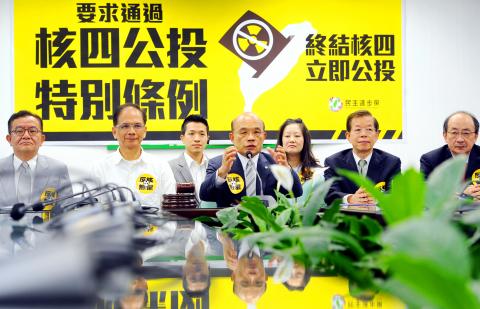The Democratic Progressive Party (DPP) yesterday said it plans to propose a special statute that will pave the way for a national referendum to resolve the decades-long controversy over the Fourth Nuclear Power Plant in New Taipei City’s Gongliao District (貢寮).
DPP Chairman Su Tseng-chang (蘇貞昌) announced the plan at a press conference after it was approved at the party’s weekly Central Standing Committee meeting, saying that stopping the construction of the plant has always been a party goal.
“A nuclear-free homeland has always been part of the DPP charter and our position remains unchanged,” Su said, adding that the 2011 Fukushima Dai-ichi nuclear power plant accident in Japan has only added urgency to achieving this goal.

Photo: Lo Pei-der, Taipei Times
The DPP’s legislative caucus is to propose a special statute calling for a referendum on the Fourth Nuclear Power Plant (核四公投特別條例) to bypass the Referendum Act (公投法), which has been described as a “birdcage act” with its high threshold and perceived unfair regulations.
The proposal would change the threshold to a simple majority. Current regulations require the participation of 50 percent of eligible voters, half of whom must cast a “yes” vote for the referendum to pass.
The special statute would also require that the referendum question be simple, asking voters whether they support or oppose the plant’s construction, Su said, adding that previous proposals on the matter had a clear political agenda.
A referendum question proposed by Chinese Nationalist Party (KMT) lawmakers last year asks: “Do you agree that the construction of the Fourth Nuclear Power Plant should be halted and that it should not become operational (你是否同意核四廠停止興建不得運轉)?”
Given the current high threshold, the referendum is unlikely to pass, thus rendering the government’s plan to put the plant into operation legitimate, critics have said.
The DPP would also demand that the referendum be held by the end of this year, Su said.
He said the DPP initiative was made in response to former DPP chairman Lin Yi-xiong (林義雄), who announced on Tuesday that he is to go on an indefinite hunger strike on Tuesday next week to urge the government to halt construction of the power plant.
Lin also called on society to make whatever effort necessary to warn President Ma Ying-jeou’s (馬英九) administration against defying mainstream public opinion.
In addition, the DPP will organize anti-nuclear mass rallies across the country and ask all candidates in the seven-in-one elections to include the anti-nuclear campaign in their platform, Su said.
Separately, Su proposed a provisional party platform initiative in response to society’s demand for “new politics” following the just-concluded Sunflower movement.
The three-stage plan, which was approved by the Central Standing Committee, calls on the party to gather opinions from a wide range of people and organizations by the end of this month before engaging in extensive discussions and formulating feasible plans next month.
The final stage would be a task for the next DPP chairman, who will be selected in the chairmanship election next month.
Su has said he is not seeking re-election as chairman.

Chinese Nationalist Party (KMT) Chairman Eric Chu (朱立倫), spokeswoman Yang Chih-yu (楊智伃) and Legislator Hsieh Lung-chieh (謝龍介) would be summoned by police for questioning for leading an illegal assembly on Thursday evening last week, Minister of the Interior Liu Shyh-fang (劉世芳) said today. The three KMT officials led an assembly outside the Taipei City Prosecutors’ Office, a restricted area where public assembly is not allowed, protesting the questioning of several KMT staff and searches of KMT headquarters and offices in a recall petition forgery case. Chu, Yang and Hsieh are all suspected of contravening the Assembly and Parade Act (集會遊行法) by holding

PRAISE: Japanese visitor Takashi Kubota said the Taiwanese temple architecture images showcased in the AI Art Gallery were the most impressive displays he saw Taiwan does not have an official pavilion at the World Expo in Osaka, Japan, because of its diplomatic predicament, but the government-backed Tech World pavilion is drawing interest with its unique recreations of works by Taiwanese artists. The pavilion features an artificial intelligence (AI)-based art gallery showcasing works of famous Taiwanese artists from the Japanese colonial period using innovative technologies. Among its main simulated displays are Eastern gouache paintings by Chen Chin (陳進), Lin Yu-shan (林玉山) and Kuo Hsueh-hu (郭雪湖), who were the three young Taiwanese painters selected for the East Asian Painting exhibition in 1927. Gouache is a water-based

Taiwan would welcome the return of Honduras as a diplomatic ally if its next president decides to make such a move, Minister of Foreign Affairs Lin Chia-lung (林佳龍) said yesterday. “Of course, we would welcome Honduras if they want to restore diplomatic ties with Taiwan after their elections,” Lin said at a meeting of the legislature’s Foreign Affairs and National Defense Committee, when asked to comment on statements made by two of the three Honduran presidential candidates during the presidential campaign in the Central American country. Taiwan is paying close attention to the region as a whole in the wake of a

OFF-TARGET: More than 30,000 participants were expected to take part in the Games next month, but only 6,550 foreign and 19,400 Taiwanese athletes have registered Taipei city councilors yesterday blasted the organizers of next month’s World Masters Games over sudden timetable and venue changes, which they said have caused thousands of participants to back out of the international sporting event, among other organizational issues. They also cited visa delays and political interference by China as reasons many foreign athletes are requesting refunds for the event, to be held from May 17 to 30. Jointly organized by the Taipei and New Taipei City governments, the games have been rocked by numerous controversies since preparations began in 2020. Taipei City Councilor Lin Yen-feng (林延鳳) said yesterday that new measures by